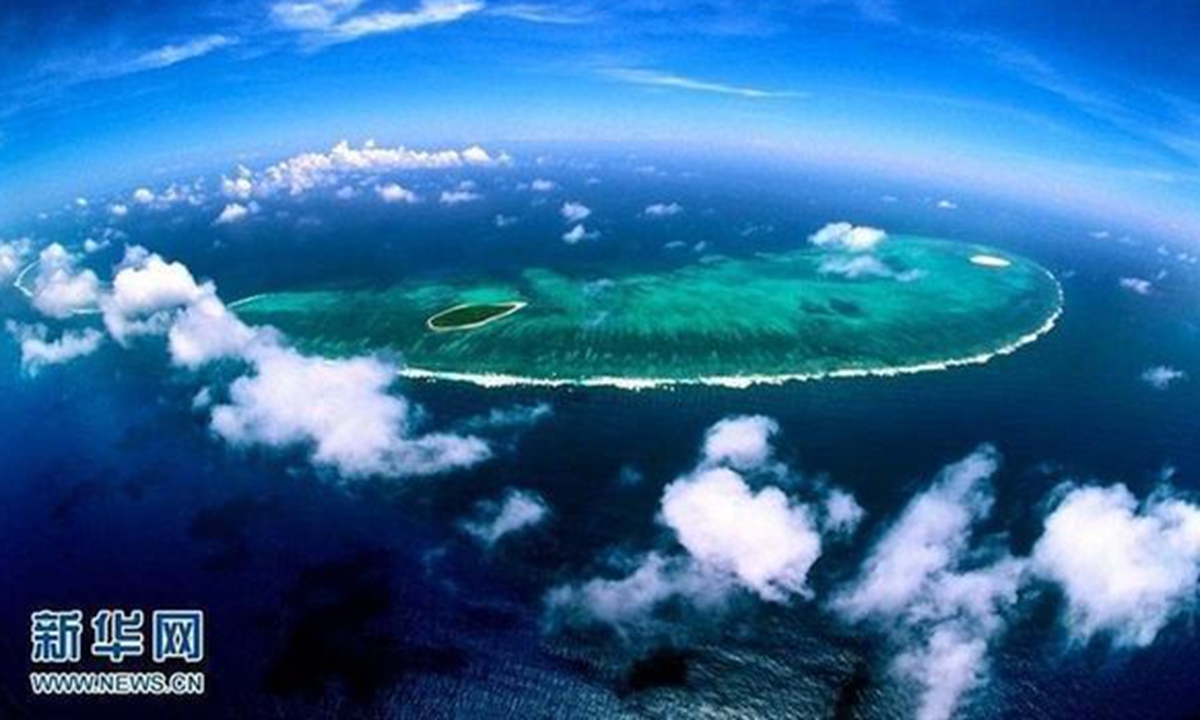Indonesia should make comprehensive considerations on the South China Sea
By Cheng Hanping Source: Global Times Published: 2020/8/4 22:28:40

An aerial photo of the South China Sea. File photo: Xinhua
Indonesia has gotten up to little tricks on South China Sea issues. Indonesia's permanent mission to the UN sent a letter to UN Secretary General Antonio Guterres in May, reminding the UN that China's claims in the South China Sea lack an international legal basis and are tantamount to an upset of the 1982 United Nations Convention on the Law of the Sea (UNCLOS). Indonesia claimed that the South China Sea dispute must be resolved in accordance with the 1982 UNCLOS.
Different from other claimant countries, China and Indonesia have no territorial disputes regarding the South China Sea. China has never claimed sovereignty over the Natuna Islands. The two countries have overlapping claims only on the exclusive economic zone.
But the reason why Indonesia has played such tricks is not surprising.
First, Indonesia is facing unprecedented pressure under the raging COVID-19 epidemic. Defense budget cuts have weakened the country's military capability in the South China Sea including Natuna Islands. Indonesia has announced it will slash its defense budget this year by nearly $588 million because of COVID-19. This will reduce the number and frequency of Indonesian navy cruises, patrols, and military drills. Indonesia's military and police systems are worried that the country will lose its previous strength to safeguard its rights at sea.
Therefore, since the second half of 2019, Indonesia seems to have stayed focused on South China Sea issues. The Indonesian president and high-level military officials have repeatedly gone to the Natuna Islands to declare its sovereignty.
Second, Indonesia misjudged the situation when it attempted to take advantage of the arbitration case in the South China Sea initiated by the Philippines four years ago. Indonesia tried to use the aggressive remarks made by US Secretary of State Mike Pompeo about the South China Sea on July 13 to justify the illegal 2016 ruling by the Permanent Court of Arbitration and to solve the existing disputes around the Natuna Islands.
Third, Indonesia tends to be clearing barriers to attract foreign investment to the Natuna Islands. In January, Indonesian President Joko Widodo and Japanese Foreign Minister Toshimitsu Motegi strengthened investment agreements in fisheries, energy and tourism in the Natuna islands, and then Indonesia apparently strengthened its original position on the South China Sea.
As a response, Chinese Foreign Minstry spokesperson Hua Chunying rightly stated that in response to the note to the UN secretary general sent by the Indonesian permanent mission, China's permanent mission to the UN has communicated China's position on the South China Sea to the secretary general.
The proposal that marine disputes should be resolved in accordance with the UNCLOS is actually unreasonable. One issue is that the appearance of the convention came much later than China's claim of sovereignty. The other is that some countries are not signatories to the UNCLOS. But they ridiculously ask others to abide by the convention.
In sharp contrast, the Philippines and Vietnam, both with serious disputes with China, did not side with the US on the South China Sea issue.
On July 27, Philippine President Rodrigo Duterte delivered his fifth State of the Nation Address. In the report, he firmly pointed out that the Philippines will continue to pursue an independent foreign policy. He noted that the country will not play cannon fodder for the US or confront China in regard of South China Sea issues.
It shows that the policy of building amicable partnerships with neighboring countries rather than implementing the beggar-thy-neighbor policy can not only maximize national interests, but also avoid being involved in disputes among great powers. The Philippines and Vietnam have made the right choice. This is worthy of reflection for Indonesian authorities.
The author is senior research fellow and professor at the Collaborative Innovation Center of South China Sea Studies at Nanjing University. opinion@globaltimes.com.cn
Posted in: ASIAN REVIEW,OTHER REGIONS